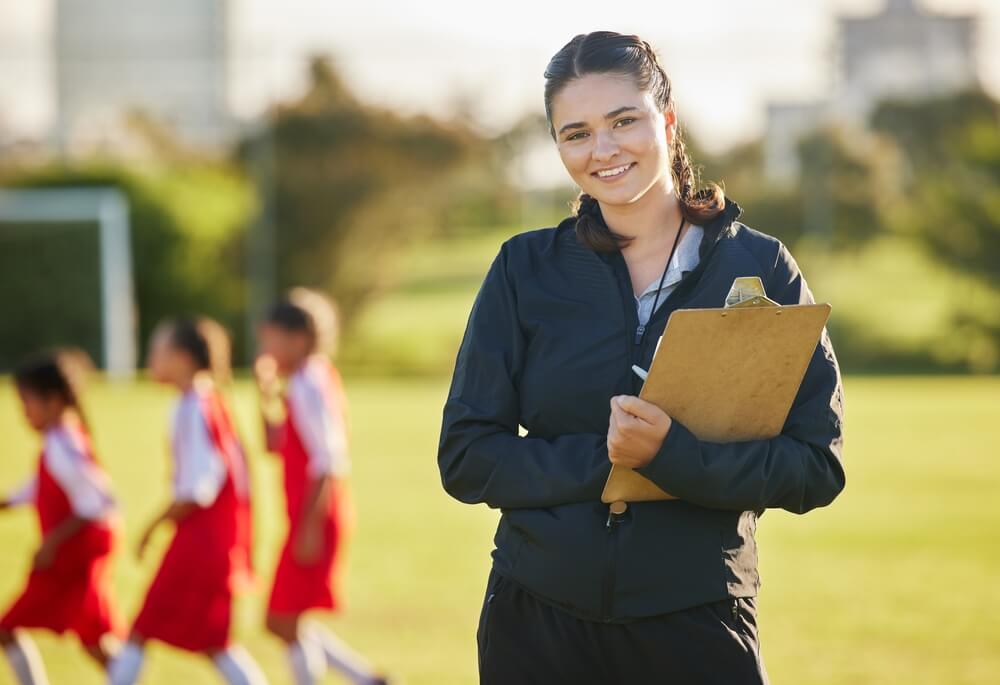For sports fans and dedicated athletes, working in sports as a career can be a dream come true. With the right education and experience, it’s possible to build a career that is dedicated to working with athletes and optimizing their performance and health.
Introduction to Sport Science Degree Programs
Sport science degree programs allow students who are passionate about athletics and sports performance to lay a strong foundation for their careers based on evidence-backed best practices. Both undergraduate and graduate-level degrees are available in sport science in online, in-person, and hybrid formats.
What Is Sport Science?
Sport science is the application of the scientific method in a way that optimizes sports performance. It is a multidisciplinary field that includes a broad spectrum of topics related to sports, including sports psychology, biomechanics, nutrition, and exercise physiology.
Why Choose a Degree in Sport Science?
Earning a degree in sport science can be an excellent way to advance your career in the field of athletics. A range of career options are available for those who graduate with a degree in sport science, including coaching at the high school, college, or professional level to work with student athletes or becoming a sports entrepreneur. Physical education teachers may also choose to earn a master’s in sport science to fulfill the requirements of their teaching credential.
Core Subjects in Sport Science Degree Programs
Sport science degree programs may have specialization built into the program, such as coaching and mental performance. However, most sport science degree programs have similar core courses, including:
- Strength and conditioning
- Injury prevention
- Leadership and ethics
- Foundations of coaching
- Sports in society
Sport science degree students may also be able to choose electives specific to their chosen specialization, such as advanced strength and conditioning, working with teams, and the brain and behavior in sports performance.
Exercise Physiology
Exercise physiology is the study of how the human body reacts and adapts to physical exertion. As part of a sport science degree, exercise physiology can help students understand how an athlete’s body performs under stress and how to program exercises that optimize recovery and long-term physical wellness.
Biomechanics
According to the National Institutes of Health National Library of Medicine, “Biomechanics is the study of forces acting on and generated within the body and of the effects of these forces on the tissues, fluids, or materials used for diagnosis, treatment, or research purposes.” A sport science degree may delve into biomechanics as it applies to exercise and sport-specific training to help people limit and recover from injuries.
Sports Psychology
Clinical psychologists require significant training and practical experience before they can earn licensure. A master’s-level sport science program with a thesis track can be an important steppingstone to a career as a clinical sports psychologist.
Nutrition for Sports Performance
Nutrition can have a significant impact on sports performance. Some sport science programs may provide an overview of sports nutrition, including how different foods, supplements, and macronutrients impact performance.
Areas of Specialization in Sport Science
Sport science is a broad field with many specializations available, including training, coaching, and sports management.
Athletic Training
According to the National Athletic Trainers Association, “Athletic trainers (ATs) are highly qualified, multi-skilled healthcare professionals who render services or treatments under the direction of or in collaboration with a physician, in accordance with their education, training, and the state’s statutes, rules, and regulations.”
Athletic trainers may work in the field with athletes as they practice and compete, or they may work in a healthcare provider’s office alongside other professionals. A sport science degree can serve as a step toward an athletic training career, but it does not provide the specific knowledge necessary to become a licensed AT.

Coaching and Performance Analysis
Coaches perform a vital role in athletic performance. A head coach may lead a team of specialized coaches or may work one-on-one with athletes participating in individual sports. Even those coaches whose roles are more targeted to administrative leadership can benefit from a sport science background, which allows them to keep athletes’ safety top of mind.
Sports Management
Although sport science is heavily focused on athletic performance and health, some students may choose to take on a more administrative role in sports. Sports management involves the business of sports and may include anything from ticket sales and facility positions to athletic director of a sports program.
Career Paths with a Sport Science Degree
Careers available to those graduating with a sport science degree depend significantly on whether students earn a bachelor’s or a master’s degree. Many more professional opportunities are available to those with a master’s in sport science.
Professional Coaching and Training
More teams and athletes recognize the importance of supporting performance in their sports along with strength and conditioning work. Furthermore, non-professionals recognize just how important resistance training is to long-term health and mobility. Strength and conditioning coaches create personalized programs for athletes of all types that are designed to meet their goals, whether that includes increased strength, mobility, cardiovascular endurance, or sport-specific performance. Some sport science programs prepare graduates to earn a Certified Strength and Conditioning Coach credential.
Sports Medicine and Rehabilitation
Both athletes and non-athletes can suffer from injuries that impact their ability to participate in sports or even to perform the tasks of daily living. Sport medicine and rehabilitation specialists may work alongside physical therapists or medical doctors to help athletes regain mobility, reduce pain, and get back to performing at a high level.
Fitness Industry Roles
A report released in 2024 indicates that the fitness industry in the U.S. alone is worth more than $22 billion. From personal trainers to gym owners to online content creators, the options keep expanding, and sport science graduates are well-positioned to jump into this industry upon graduation.

Sports Management and Administration
Sports management and administration is an ideal career path for those who are passionate about sports but who may not thrive working one-on-one with athletes. Sports management professionals can take on a wide range of roles from team management, facilities administration, and sales, marketing as well as sports representation for professional athletes.
Benefits of a Sport Science Degree
A sport science degree can provide an important foundation for those who want to jumpstart or grow a career in the fast-paced and competitive world of sports.
Versatility of Career Options
The versatility of career options for sport science graduates is one reason that this degree may be a great fit for many different individuals. Some roles involve close, personal interactions with athletes and other sports professionals, such as coaching or training, while others focus on behind-the-scenes roles in management and administration, including sports agents or athletic directors who provide essential support for athletes and athletic programs.
Growing Demand for Sports Science Professionals
According to the Bureau of Labor Statistics (BLS), the demand for entertainment and sports professionals is expected to increase faster than the average for all jobs between 2023 and 2033. These statistics include professional athletes as well as coaches, scouts, and sports officials. The demand for fitness trainers is expected to increase by 14% over the same time span, and the demand for athletic trainers is expected to increase by 13%. These increases account for thousands of new jobs over the next decade, making this the perfect time to build a career in the sports industry.
How to Choose the Right Sport Science Program
Investing in a higher education degree is a big decision. The right sport science program for one person may not be the right program for another. Potential applicants should consider the reputation of the school and its sports science program, accreditation, and opportunities for internships and practical experiences.
Accreditation and Reputation of Programs
Sport science programs may earn accreditation from a range of different accrediting bodies, including:
- Commission on Accreditation of Allied Health Education Programs (CAAHEP)
- International Universities Strength and Conditioning Association (IUSCA)
- Commission on Accreditation of Athletic Training Education (CAATE)
Some sport science programs may not have specific accreditation, in which case the school itself should be accredited by one of the nationally recognized accrediting organizations for higher education. Applicants should also consider the reputation of the program among its graduates and local businesses that employ those graduates.
Internships and Practical Experience
Many sport science careers involve working closely with athletes and other sports professionals. Internship and practical experience opportunities can give sport science students a significant advantage in their job searches after graduation. Not only do these experiences offer students a chance to do the real work of a sport science professional, but they also help them make critical connections and develop relationships with working professionals.
Learn More About the Master’s in Sport Science at Sage
Russell Sage College offers a popular master’s in sport science degree with a focus on coaching and mental performance. Targeted at physical education teachers who want to take the next step in their coaching careers, this online program can be completed in less than two years, depending on courseload. Students learn about the essential connections between mental health and well-being and sports performance and how to best coach student athletes with a focus on social-emotional development.
Prospective students can apply today or reach out for more information.

